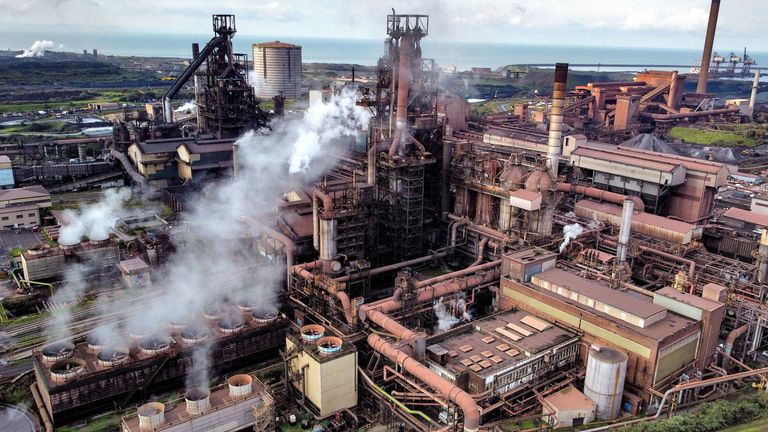‘This isn’t over’: Unions vow to fight rejection of plan to save Tata Steel jobs
Unions have warned of a bitter fight ahead after their plans to avert thousands of job losses at Tata Steel were rejected by the company.
Tata had announced in January a consultation on cutting up to 2,800 jobs in the UK, the majority of them at the country’s biggest steelworks in Port Talbot, South Wales.
It followed confirmation the Indian-owned firm wanted to close down the blast furnaces at the plant and replace them with electric arc furnaces under a plan to reduce emissions and costs.
GMB, Unite and Community union representatives met Tata counterparts at a London hotel to discuss the way forward on Thursday morning.
But the GMB said Tata informed them the blast furnaces would be closed by the end of September, describing the decision as an “unwelcome but not expected slap in the face”.
The company has consistently argued its £1.25bn investment would secure the future of UK steelmaking.
“It would protect the majority of jobs, reduce the UK’s carbon emissions by five million tonnes a year and could kickstart a green industrial revolution in South Wales,” a spokesperson said.
However, its operations are now widely expected to face strike action.
Members of Community and the GMB are being balloted on whether to walk out over the plans.
Unite members have already voted in favour of industrial action.
The unions had urged Tata to abandon the government-supported switch to so-called green steel by signing up to an alternative plan that would raise productivity and protect jobs across the supply chain.
They argued that Tata’s proposals would rid the UK economy of its last remaining “virgin” steelmaking facility and commit thousands of jobs to the scrap heap for no reason.
Community general secretary Roy Rickhuss said: “It’s incredibly disappointing that Tata have chosen to reject the multi-union plan, which is an ambitious and viable alternative to their destructive bad deal for steel.
“We do not accept the company’s assertion our plan was too expensive – in fact, it would have returned the company to profits, and the additional capital expenditure needed to make it a reality could have been funded by an additional £450m from the government – a drop in the water compared to what other European countries are investing in their domestic steel industries.
“Tata have made their decision, and our members will decide on our collective response.
“Tata made a proposal to negotiate a package with the unions to give us firm assurances on jobs and future investment, and we will consult our members on how we proceed
“We want to make one thing absolutely clear to the company: this isn’t over – not by a long shot. We will never stop fighting for our jobs, our industry, and our proud steel communities.”
Be the first to get Breaking News
Install the Sky News app for free



Tata Steel chief executive and managing director TV Narendran said of the outcome: “Having looked carefully at all the options over the past seven months in consultation with union representatives, we have decided to proceed with our proposed restructuring and transition.
“This is the most viable proposal, in contrast to the unions’ unaffordable plan which has high inherent operational and safety risk.
“Our proposal secures a long-term future for the business and preserves the majority of jobs in the UK.
“We will continue to work with the trade unions over the following 2 weeks to agree a memorandum of understanding on the future of the UK business and the impact on our people.
“Tata Steel is committed to creating a low-CO2 steel business at the heart of a green industrial ecosystem in Wales and the wider UK to safeguard steel supplies and create economic opportunities for generations to come.”





